I compared the most expensive VPN against the cheapest – here's what I found
Does price really matter when it comes to privacy?

Price is often the biggest deal-breaker when you're working out which provider has the best VPN app for you. But do you really get what you pay for, and can a cheap VPN take on the most expensive premium providers?
I've pitted the two extremes against each other – ExpressVPN vs PureVPN. You'll find each of them in my best-of lists, and it's no surprise – they're both popular and have been around for a long time.
Of course, my ExpressVPN review and PureVPN review ratings tell a clear story, but there are some pretty surprising outcomes when we compare them head-to-head in the most important areas.
If there's a specific point you really want to know about, the nav bar will take you straight there. Otherwise, just keep scrolling.

I've been in charge of Tom's Guide's VPN articles since 2020, and in that time I've helped test and review over 100 VPN providers for both Tom's Guide and TechRadar. I strongly believe that privacy, price, and ease of use all go hand in hand to make the very best products.
Plans, pricing and trials
Let's start off with the headline facts. ExpressVPN is expensive – more so than just about every other VPN out there, excluding specialist services like Astrill VPN. The cheapest you'll find ExpressVPN is $6.67 per month on a 12-month plan. You can get this by claiming three months free for Tom's Guide readers – effectively making this a 15-month plan.
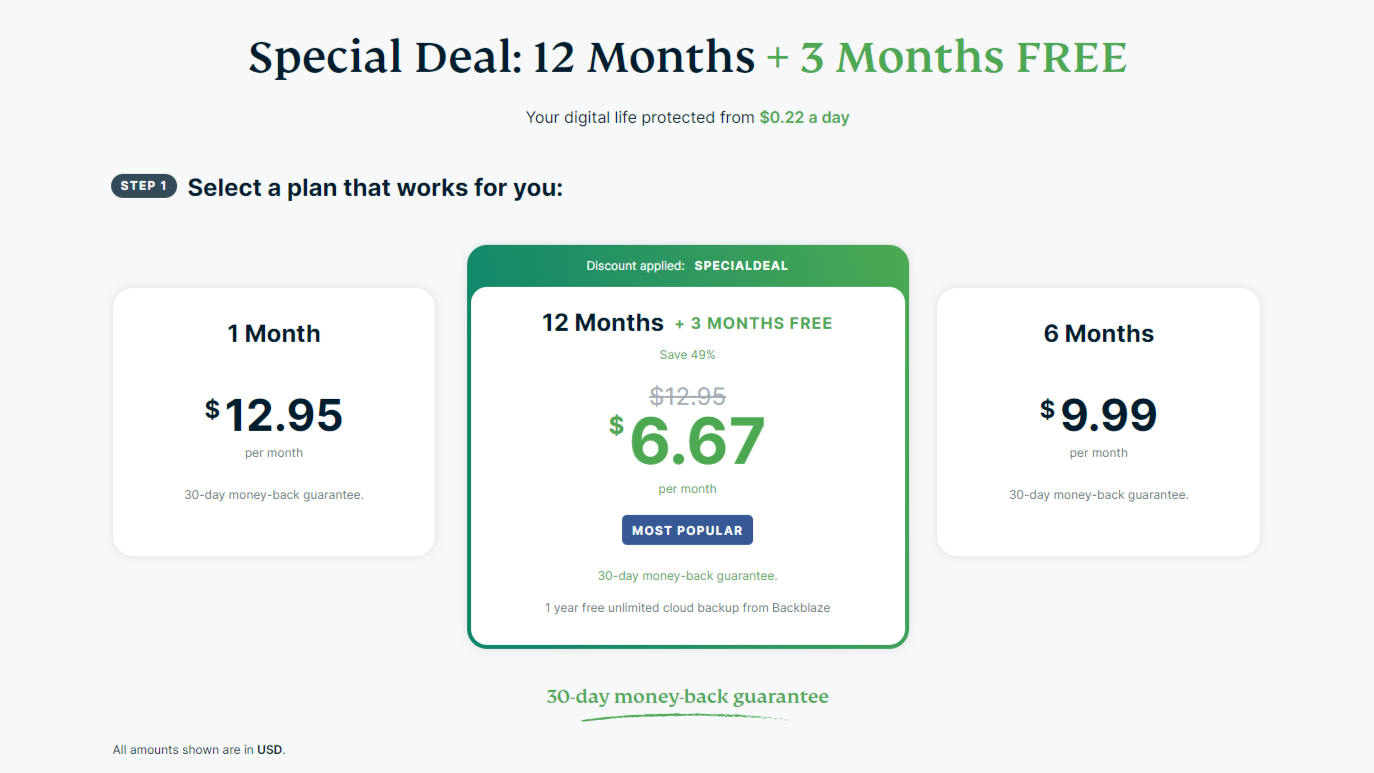
If you're cautious, you might want to go for a shorter six-month or single-month plan. The six-monther comes in at $9.99 per month, and you’ll pay $12.95 for a single month. No massive bargains there, then.
PureVPN takes a rather different approach. Rather than sticking to three or so deals, you'll find an array of prices, lengths, and bundle plans. I can't list them all here, and there are probably offers I’ve never come across hidden in some dark corner of the site, but there certainly are some standouts.
For maximum value, the five-year plan is unbeatable at just $1.66 per month, although that's a pretty hefty chunk of time to commit to one provider. The next best is the one-year plan at $1.99 per month, which includes PureVPN's password manager. There's a less appealing two-year plan at $2.11 per month, that comes with two months free, or you can upgrade to "PureMax", which will set you back $3.85 per month. Prices do rise on renewal, though, so be aware of that and cancel any auto-renewing subscription options before you get stung.
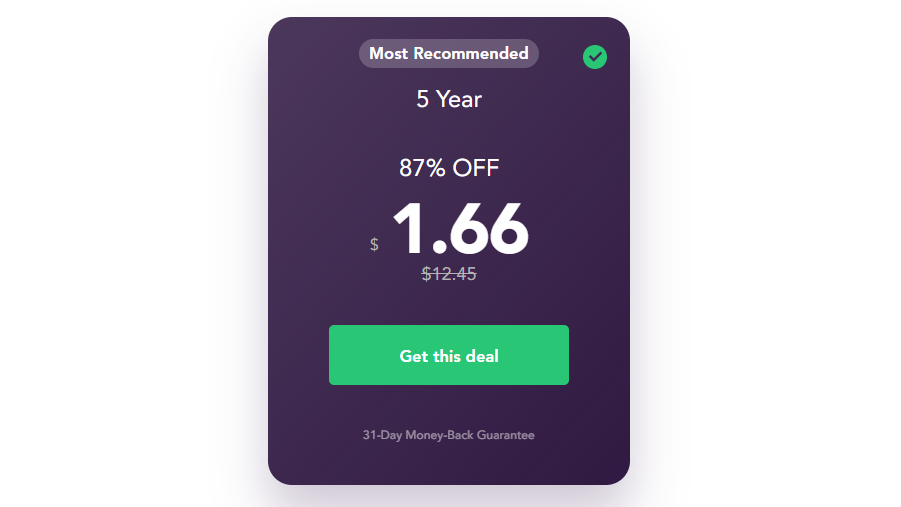
The five-year plan is incredibly cheap...

...as is the one-year plan which includes a free password manager.
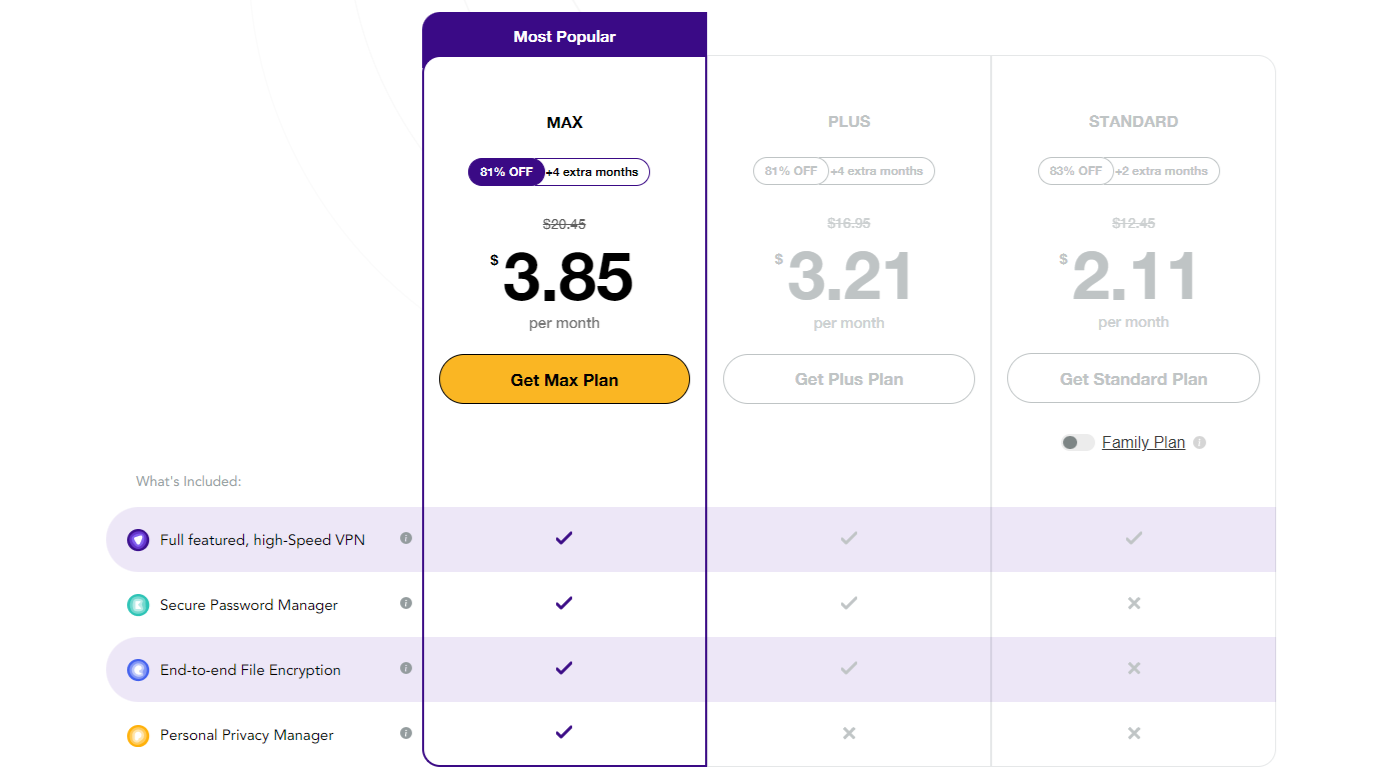
Anyone visiting PureVPN's website without being referred through one of our links won't see the same value, but PureMax definitely looks like a bargain.
Clicking through from the PureVPN website – as opposed to using one of the links above – will get you a one-year price of $3.74 per month, which you obviously won’t be buying, while single-month plans start from $10.95, and top out at over $20 all-in for the full range of products.
PureVPN also offers a 7-day trial for $0.99, but you’re best off making the most of the money-back guarantee. Both providers offer this – ExpressVPN gives you 30 days to claim a refund, and PureVPN gives you 31.
So, it's clear that even if you end up getting a bad deal from PureVPN, you’re still paying half of ExpressVPN’s best possible price. Even single-month plans are cheap with PureVPN – but this is the name of the game.
Winner: PureVPN
Privacy and logging
This is where it gets important. VPNs are first and foremost privacy software – all the Netflix hacking and location spoofing stuff comes after that fact. Having rock-solid no-logs policies, powerful encryption and key tools like a kill switch is essential, and no amount of bargain power should sway that.
This is where you'll see why ExpressVPN costs so much – it's absolutely rock solid. It uses industry-standard AES-256 encryption which is unbreakable with today’s tech, and was one of the first – and still one of the few – to implement post-quantum encryption in preparation for Q day.
Available with its in-house, open-source Lightway protocol, this is a welcome step that futureproofs its your information. It's joined by one of the most robust kill switches I've tested, and apps that make it easy for anyone to stay safer online.
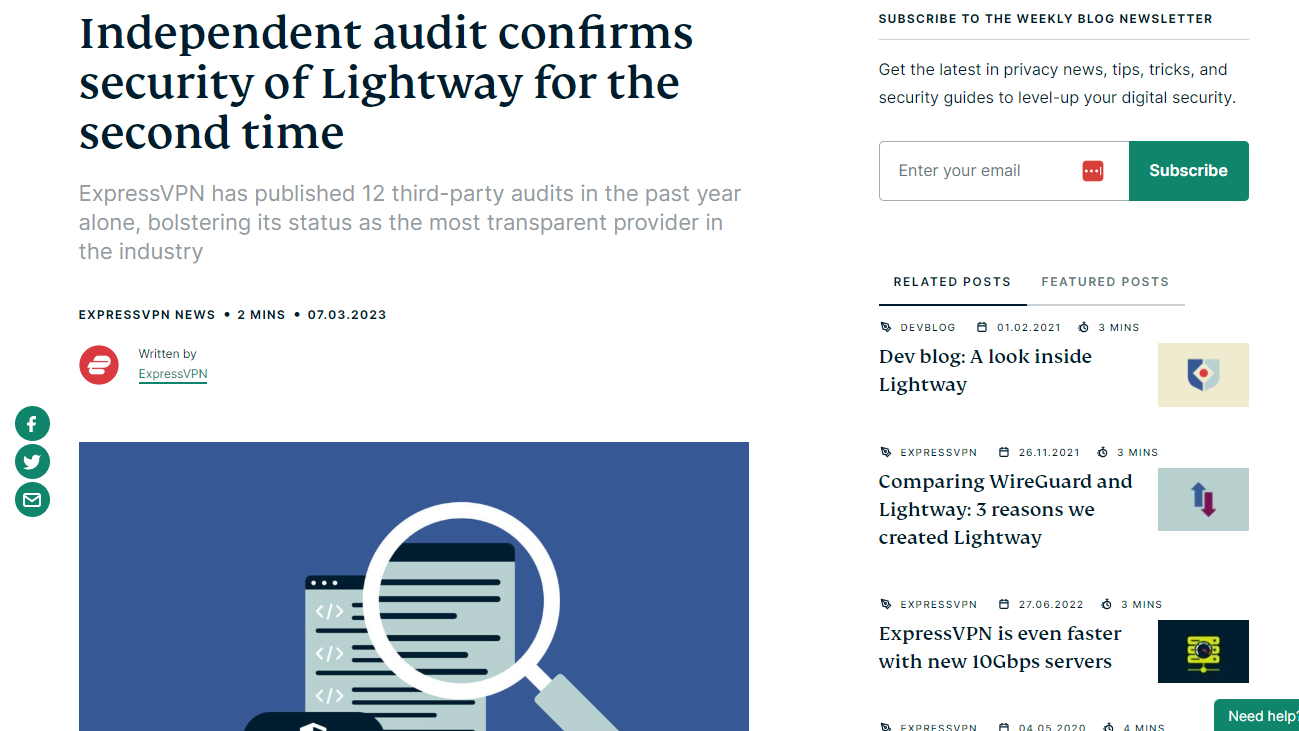
Lightway itself is fully audited, and ExpressVPN has had almost every other aspect of its service inspected by third parties too. In 2023 it underwent 12 audits, focusing on its various apps, its privacy policy, key features, and of course, Lightway.
The logging policy is excellent too, stating in plain English that no identifiable data about you or your activity is stored, which the audit helps back up.
With PureVPN it's certainly not a horror show, but there are a few areas that need improvement. Straight off the bat, it has a black mark on its record – in 2017 a man was arrested and records from PureVPN were used as evidence. Since then it's cleaned up its act and now has a fully audited no-logs policy, which would normally be music to my ears.
In my deep dive, however, I found that PureVPN "does collect the day you connected to a specific location, your ISP, the connection length, how many connections you make, and your overall bandwidth usage." This can't identify you in and of itself, but it does run the risk of a correlation attack, and I'd like to see a more privacy-focused approach to user data.
You may be wondering "Why didn't the audit identify this?" Well, that's because the audit is looking to see if the product works like it says on the tin – i.e. whether it's doing anything it shouldn't be, or that it isn't telling you about. If the policy says it's collecting this data, then the audit won't identify it as an issue because you're being told about it.
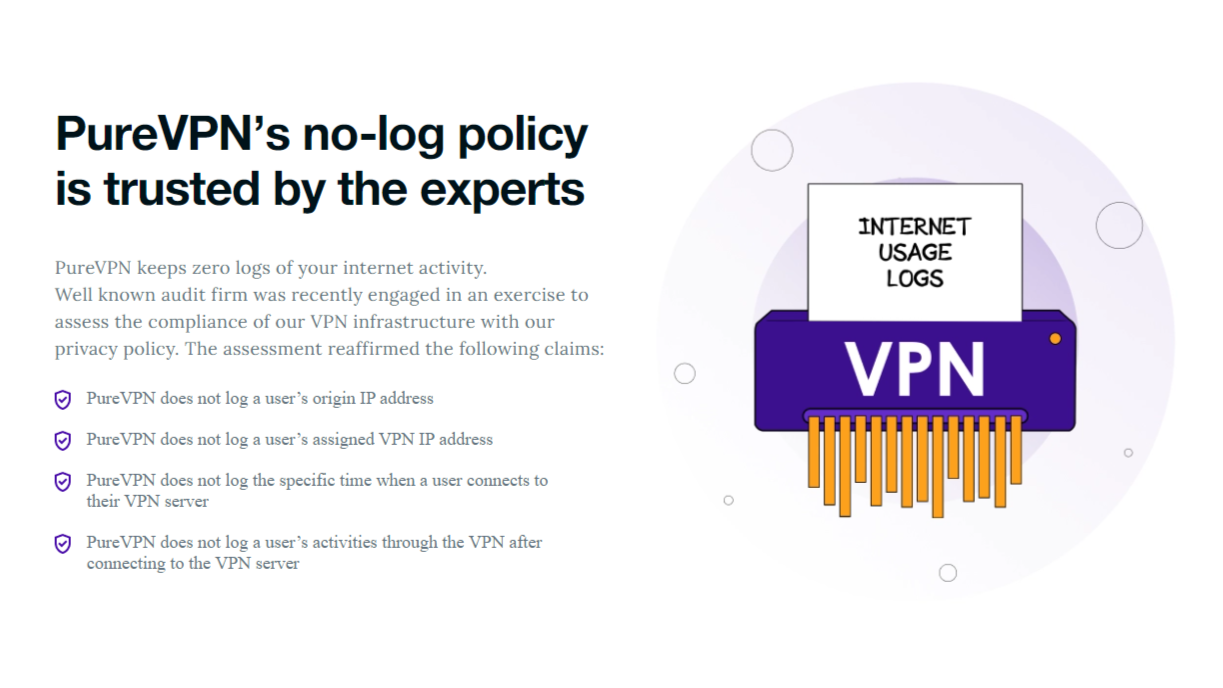
Support for OpenVPN and WireGuard is great – both use industry-standard encryption – and you'll get a kill switch, IPv6 and DNS leak protection, port forwarding (albeit ExpressVPN is router only), and the ability to use a non-NAT network to use a unique IP address.
In my testing, though, I did notice a DNS leak when using OpenVPN, although WireGuard was unaffected. This is a bit of a red flag, and probably my biggest concern with PureVPN when it comes to privacy.
Winner: ExpressVPN
Performance
This section won't need too much analysis – I'll just give you the numbers.
When tested on an uncontested 1 Gbps connection, ExpressVPN delivered peak speeds of 750 Mbps when using Lightway, and 210 Mbps when using OpenVPN. This puts it about tenth out of all the providers I’ve tested, and while it's not one of the fastest VPNs around, it's pretty close.
PureVPN, on the other hand, is up there with the best. When using WireGuard it maxed out at 880 Mbps, and when using OpenVPN it matched ExpressVPN at 210 Mbps.
So from the figures alone, PureVPN outdoes its top-shelf rival here.
Winner: PureVPN
Streaming
Using VPNs for streaming is becoming more and more popular, so testing different services’ performance is a core part of my reviews. I attempt to access several Netflix libraries, including the UK, US, Canada, Japan, and Australia, Amazon Prime Video, Disney+, and BBC iPlayer, alongside lots of smaller regional streaming sites.
In short, I connect to a range of servers in the country of the streaming service in question and see if I can watch the geo-blocked shows and films.
Both ExpressVPN and PureVPN performed very well in my last round of testing. ExpressVPN accessed everything I tried to watch, and did it with limited fuss. PureVPN's only hiccup was that it couldn't unblock the Australian streaming site 10Play.
Overall, ExpressVPN is the better streaming service, but in practice, this is a very close-fought battle.
Winner: ExpressVPN
Apps
App design is a very personal thing, and what one person likes, another may find annoying to use. The good news, however, is that on the surface, both ExpressVPN and PureVPN have attractive, simple, easy-to-use apps.
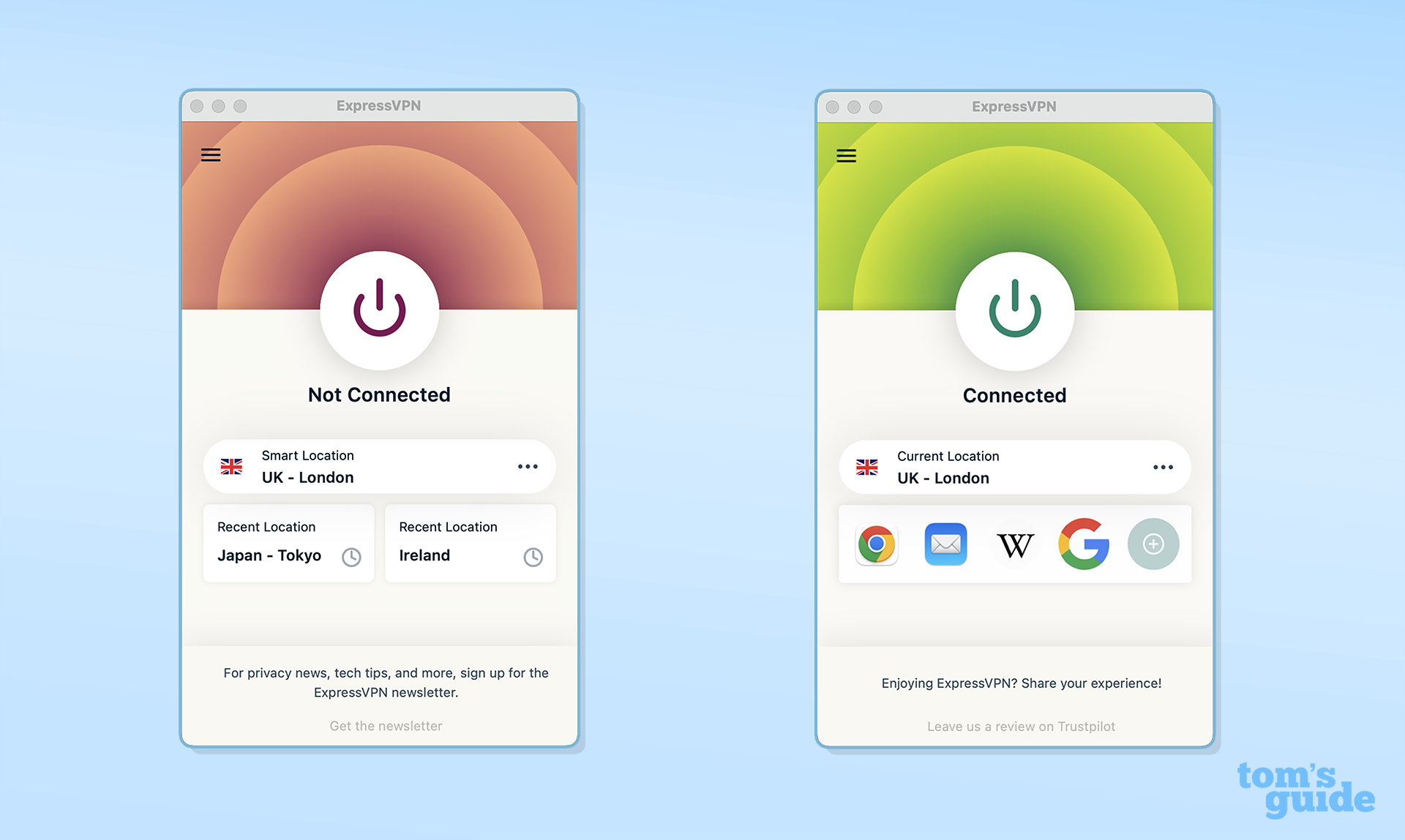
The first thing you see is a big on/off switch.
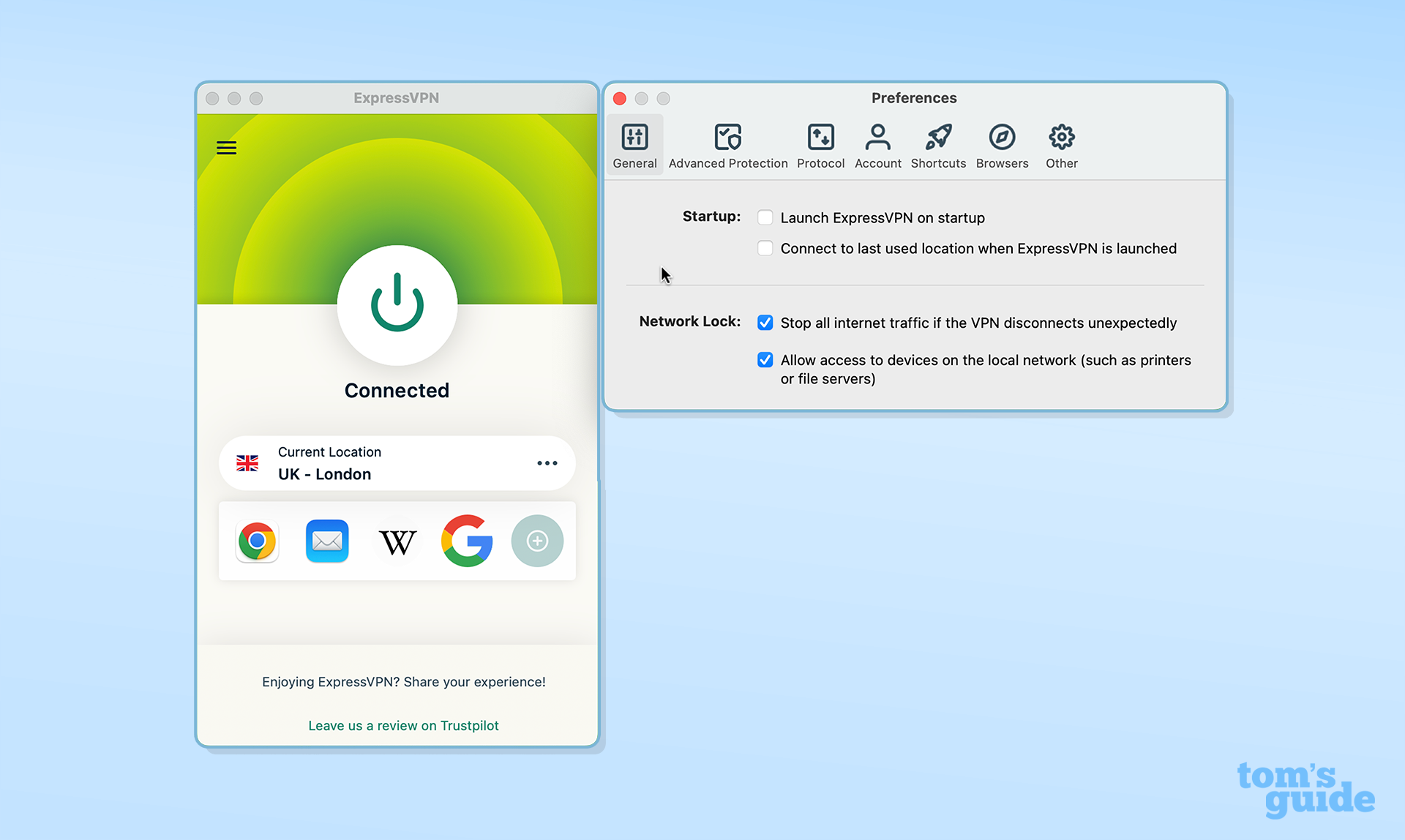
The settings dialog box is easy to understand.
I often say that ExpressVPN has the best interface for beginners out of any provider, and coming back to it and considering its pros and cons when writing this article has only cemented that fact. One big fat on/off button is all that the vast majority of people will ever need, and a single click to change your server is nice, too.
Opening up the settings will bring you to a nicely laid-out standalone dialog box, wherein you can adjust your protocol, privacy settings, and plenty more.
PureVPN, on the other hand, now looks remarkably like big-name rivals Surfshark and NordVPN, with a larger window that has more options immediately available. You can still connect in a single click, and another will take you to a similarly well-laid-out locations pane. In my recent experience the apps are pretty reliable, and do everything you need them to.
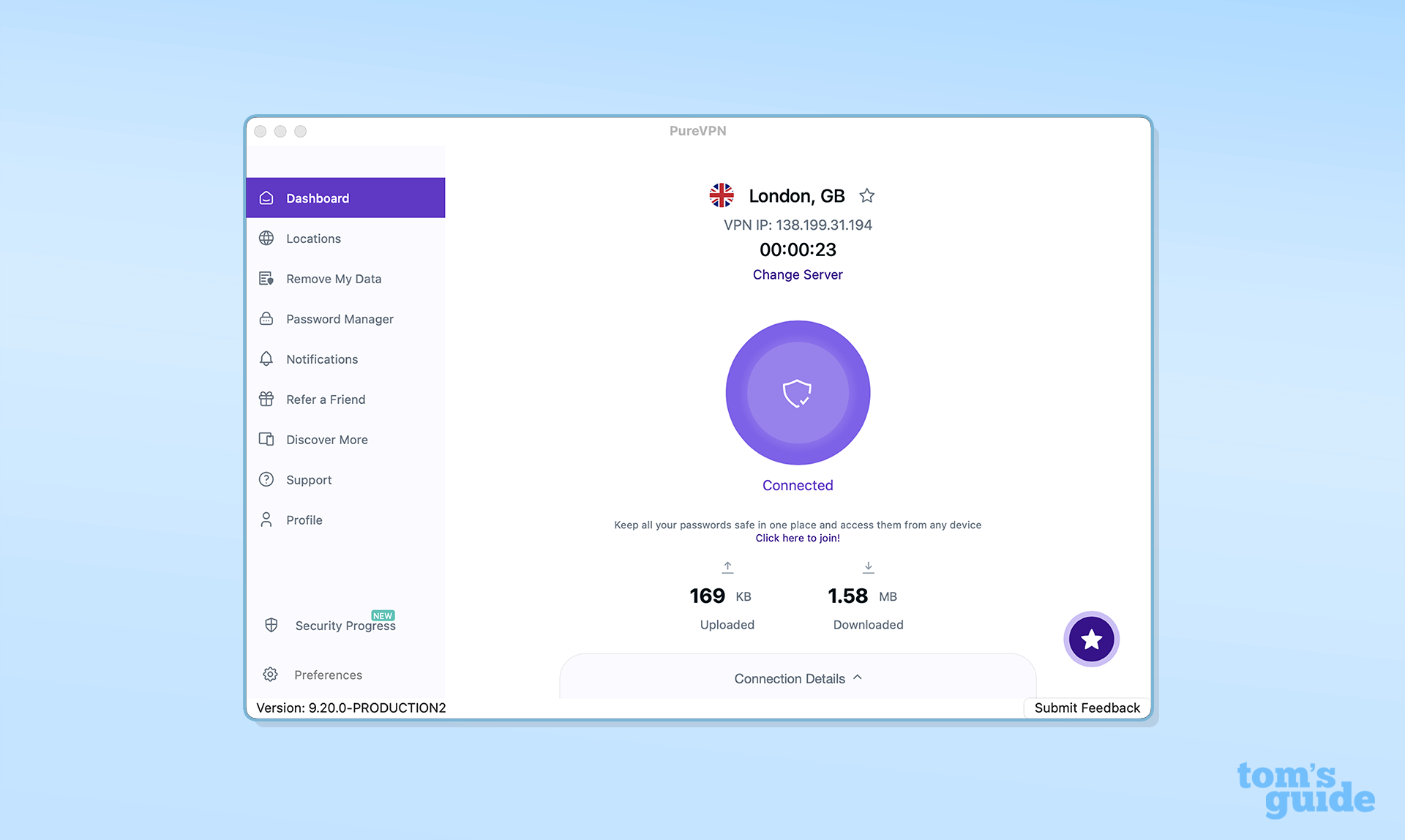
PureVPN's apps are easy on the eye, too.
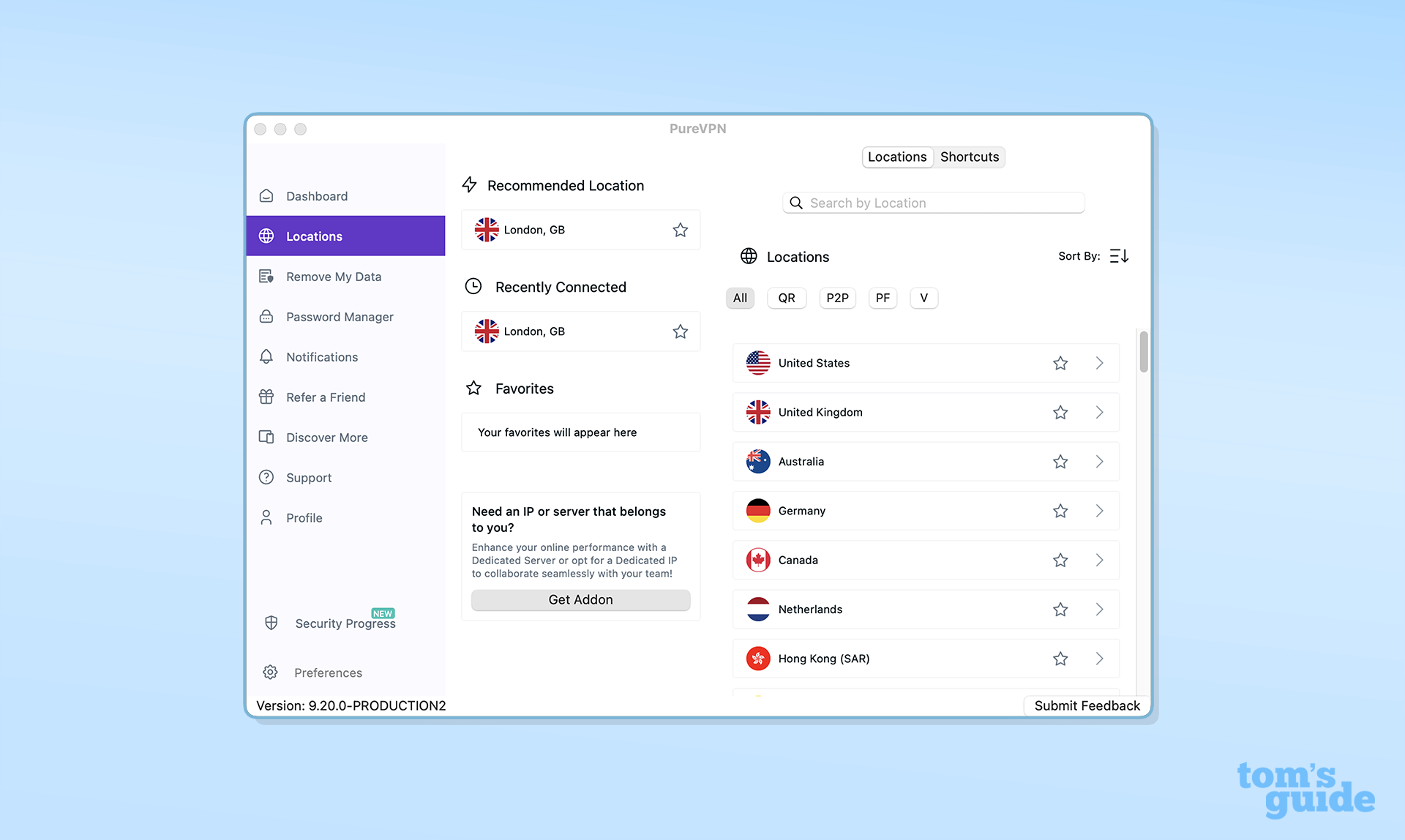
Navigation is simple, but please don't upsell me within the app.
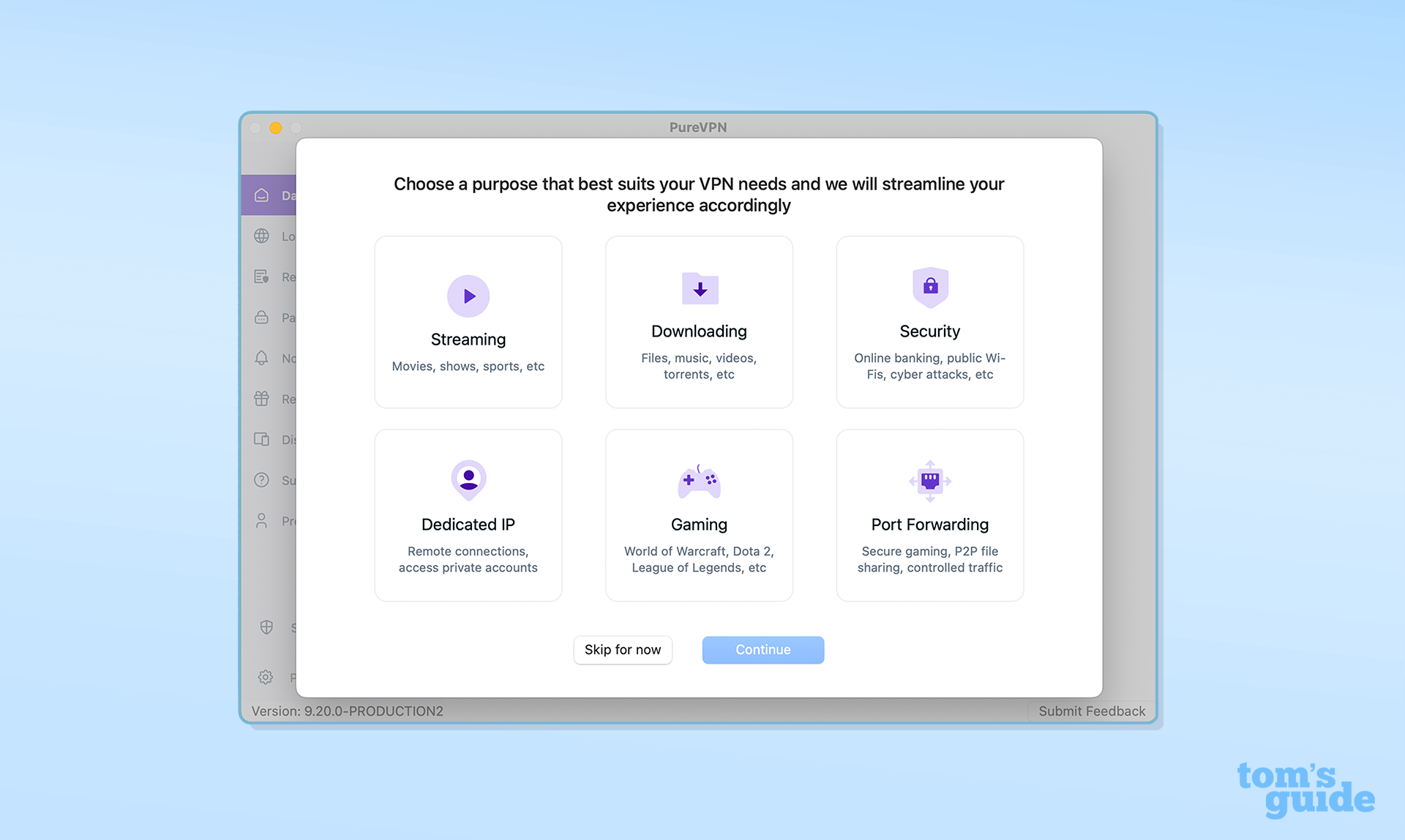
I'd prefer to set the software up myself – but permanently skipping this setup wizard isn't an option.
However, PureVPN can be annoying. The app pesters you to rate and review it on the App Store, has only temporarily skippable setup wizards that I personally don't want to go through, and tries to sell you products from within the app, which I very much do not appreciate. I've always found nagware and in-app ads make me not want to use an app, rather than encourage me to invest further in the brand.
The window can't be resized, and unlike some rivals, different parts of the dashboard can't be hidden to reduce its footprint. ExpressVPN can't be resized either, but it's dinky enough to get away with this.
It's also worth noting that while it's not really part of the app, the account area of the website is, for want of a better word, rubbish. At the time of writing, I can't even see how long I have left on my plan. While this may well be a temporary blip, the sheer lack of information feels a bit sinister if it's intentional – like it wants you to fall victim to auto-renewal.
If PureVPN was the only VPN you had ever used, you could be forgiven for thinking it’s up there with the very best – the apps are fairly decent to use, and certainly don’t have anything catastrophically wrong with them. In my opinion, though, the second you open ExpressVPN it becomes clear which provider has invested more into providing a user-first interface.
Winner: ExpressVPN
Extra features and tools
Nowadays, when you buy a VPN, you rarely just get a VPN. Bundle deals with extra privacy products can be a real selling point, and tons of providers are jumping on that bandwagon.
So, for the price, you’d think ExpressVPN comes with a whole host of extra features, right? Well, not exactly. ExpressVPN is well-known in the industry as a slow, steady, and cautious company, and while the quality of its products reflects this, so does its fairly minimal range of tools.
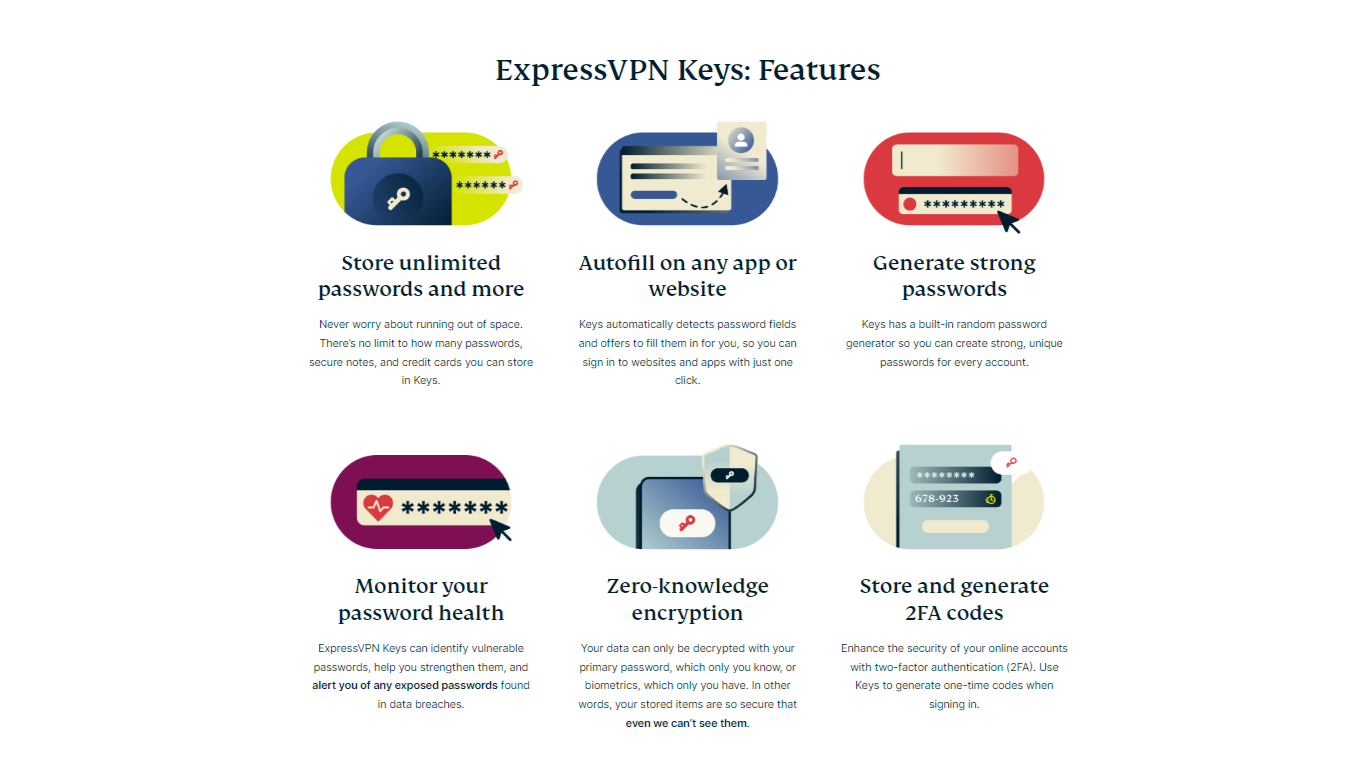
Free forever with any ExpressVPN subscription is Keys, a password manager. It's robust, privacy-focused, and a nice addition to your plan. Sign up through Tom's Guide and you'll also get a year of BackBlaze cloud storage for free. But… that's about it.
Of course, splash out almost $200 and you can purchase the unique Aircove router, which has ExpressVPN's functionality built in, but in terms of extra software and tools – free or paid – it's slim pickings from Team Red.
PureVPN is another story entirely – so much so that it's taken me a while to get my head around everything on offer.
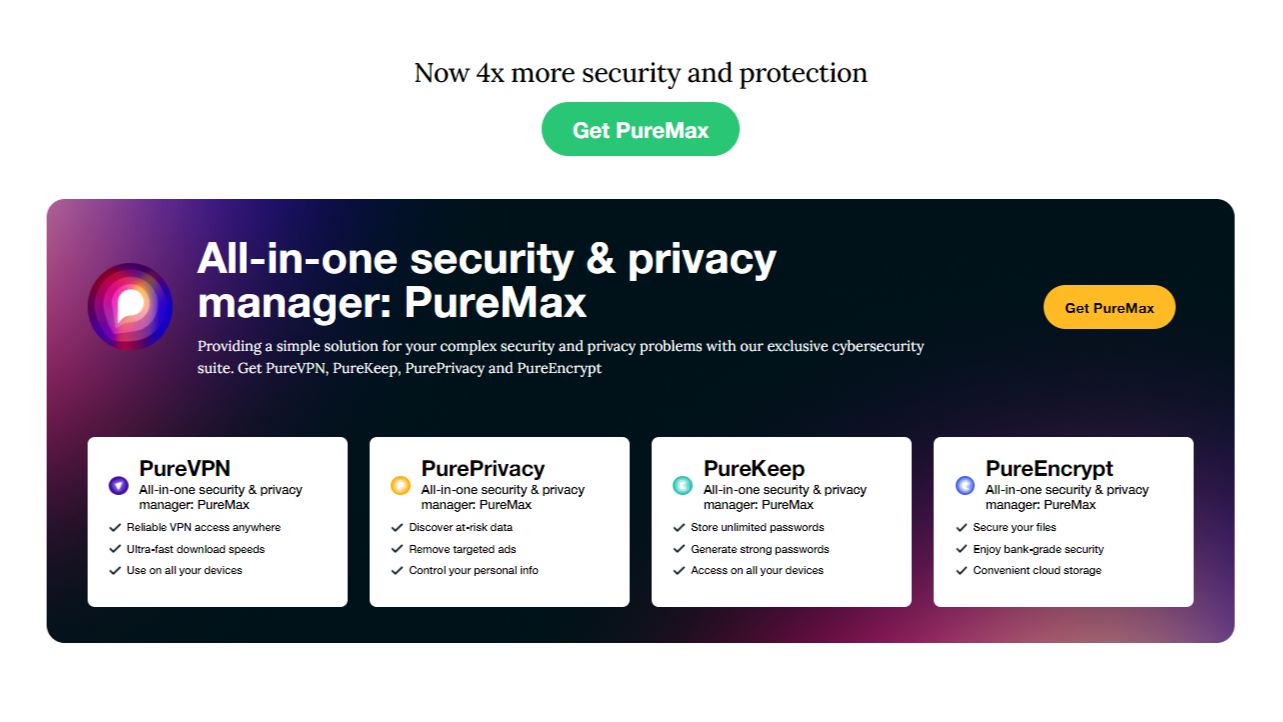
Off the bat, nothing comes for free – unless you sign up for one of the deals I outlined above. However, the PureMax package bundles everything together in one, and it's still cheaper than ExpressVPN on its own.
With PureMax, alongside the VPN you'll get PureKeep password manager, PureEncrypt cloud storage, and PurePrivacy, a digital privacy manager that helps delete your personal information from data broker lists. The latter is similar to Surfshark's Incogni, and although I haven't been able to properly trial PurePrivacy yet, these services are typically quite useful for reducing spam and reclaiming your digital privacy.
On top of all of that, PureVPN also offers PureDome, which is its business VPN suite, and all of this is in line with the trend of VPN companies trying to do everything.
PureVPN's apps have marginally more features too, with port forwarding being the standout. While few people will want it, those who do will see this as a big plus over ExpressVPN.
Overall, if you need all of these tools and are on a tight budget, PureVPN has the upper hand here.
Winner: PureVPN
ExpressVPN vs PureVPN: which is better?
In my opinion, when you take money out of the equation it’s clear that ExpressVPN is the superior VPN product. It's nicer to use, has better privacy credentials, and unblocks more streaming sites.
However, PureVPN isn't out of its depth, and if you go for one of the plans that drops the price below $2 a month, it's an absolute bargain. Add in all the additional features, and you’ll also have a much wider suite of privacy tools to back you up.
It’s worth noting that my #1-rated provider, NordVPN, sits in between these two in terms of price. It offers decent value, top-notch privacy and streaming, and a huge range of extra features available to purchase – and for those bargain hunting, I'd recommend Surfshark over PureVPN all day, every day.
In this comparison, though, it's clear to see that you do get what you pay for – but the difference might not be quite as big as you think.
We test and review VPN services in the context of legal recreational uses. For example:
1. Accessing a service from another country (subject to the terms and conditions of that service).
2. Protecting your online security and strengthening your online privacy when abroad.
We do not support or condone the illegal or malicious use of VPN services. Consuming pirated content that is paid-for is neither endorsed nor approved by Future Publishing.
Get instant access to breaking news, the hottest reviews, great deals and helpful tips.

Mo has been rigorously testing, reviewing, and analyzing VPN services at Tom’s Guide for more than five years. He heads up the three-person Tom's Guide VPN team, and is passionate about accessibility: he believes that online privacy should be an option that’s available to everyone. NordVPN and ExpressVPN are the products he uses most on a daily basis, but he experiments weekly with all the top services, evaluating their privacy features, connection speeds across various protocols, and server reliability – among other things – so that he can make confident VPN recommendations that are backed by data. To see his latest advice, head over to Tom’s Guide’s best VPN and best free VPN guides.
 Club Benefits
Club Benefits





